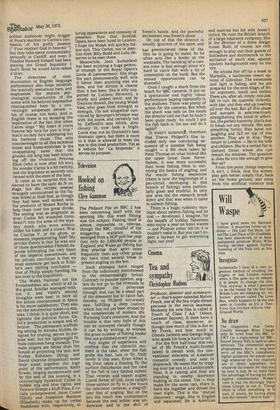Television
Hooked on fishing
Clive Gammon
The Philpott File on BBC 2 has been concerning itself with the sporting life: this week fishing was the subject. Fishing itself is almost impossible to televise, though the BBC, mindful of the staggering statistics which emerged from a NOP poll last year (not only do 2,850,000 people in England and Wales go fishing but they practise their sport more frequently than any other group do) have tried several times to present angling on the box.
Such attempts have ranged from the ludicrously misinformed to the embarrassingly lyrical. Contrary to popular opinion, anglers do not go to the riverside to contemplate the primroses (though that can be a small part of the pleasure) but to catch fish, thereby, as Philpott accurately saw, fulfilling a deep instinct which has not yet been eroded by the complexities of modern life. Pursuing God's creatures. And the trouble is that very little of this can be conveyed visually though it can be by writing, as witness the great number of fishing books that are published every year.
Any angler of experience will confirm that the climactic moment is the take, when the fish grabs the bait, lure or fly. Onlj, rarely is this seen. Even when a big trout takes a floating fly the surface disturbance and the view of the fish is very limited indeed. That veteran and expert angler, Lionel Sweet of Usk, once caught three salmon on fly in a few hours for television cameras, a magnificent feat of angling. But on the box the result was unimpressive because the real action was underwater and in the skill of
Sweet's hands. And the powerful excitement was Sweet's alone.
On top of this the director is usually ignorant of the sport and has preconceived ideas of the film he is going to make. So he often acts like a booby on the waterside. The handicap of a camera crew is bad enough since it's hard to catch fish with a lot of commotion on the bank. But the missed opportunities can be shameful.
Once I caught a shark from the beach for BBC cameras. It put on a spectacular and highly visual performance leaping repeatedly in the shallows. There was plenty of action for the cameras. But when the shark was safe on the sands the director told me that he hadn't been quite ready. So could I put the fish back in the sea and do it again?
It wasn't surprisint, therefore, that Trevor Philpott's film included only one convincing sequence of a sizeable fish being caught — a 61b chub taken by Peter Thomas on what looked like the upper Great Ouse. Nevertheless, it was more successful than most fishing films in conveying the basics of angling; and the match fishing sequences (there is now the beginnings of a pro-circuit developing in this branch of fishing) were particularly good and truthful. In only one area did the research break down and that was when it came to salmon fishing.
There is a huge, rubbishy mystique about salmon fishing and its cost — developed, I imagine, for the benefit of holiday fishermen who enjoy a year on hotel waters — and Philpott either fell for it or couldn't resist it. But you can't expect a layman to get everything right, can you?


































 Previous page
Previous page